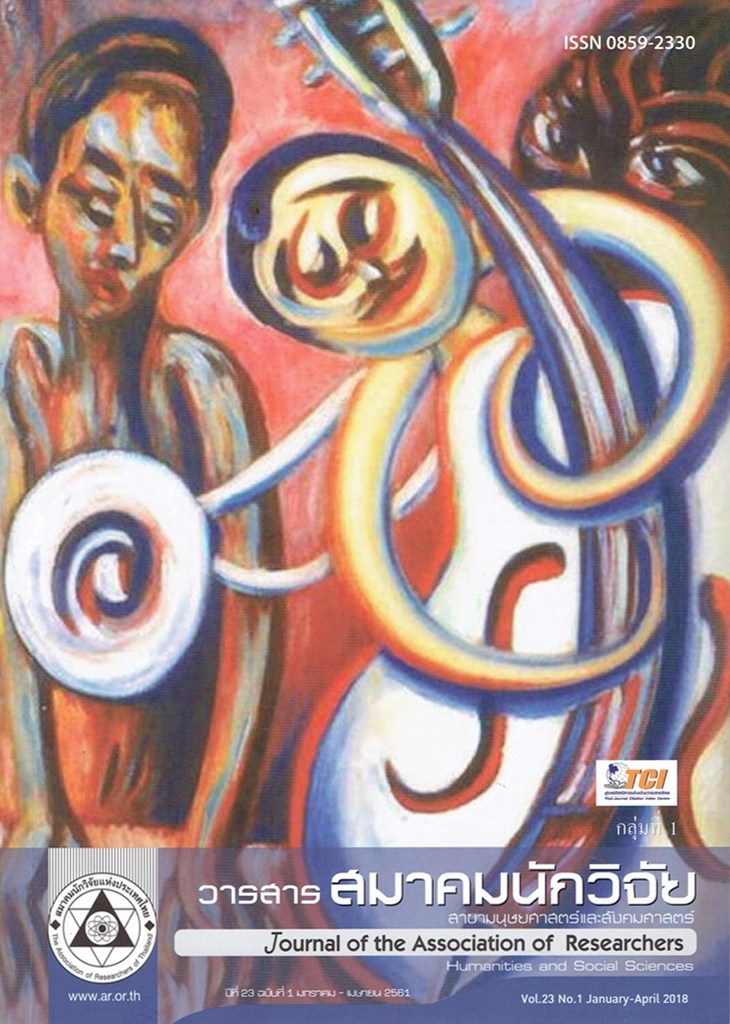Model of Social Management Innovation and Thailand 4.0 Policy
Main Article Content
Abstract
Due to the constant change of information management system and technology, this article aims to propose a model of social management innovation which paid attention to the interface between digital technology and CCTV-based data (“The Past”). Thai public and private sectors have substantially invested in data collection and storage. Yet, there still unsystematic and unorganized process of management. The value creation from data analytics has been disconnected and lack of full participation with other relevant stakeholders. Particularly, CCTV-based data which acts on behalf of human eyes and minds to monitor and insure safety and security of life and property in city areas has been left unattended and unutilized. Most investors and governmental authorities have just followed a trend of installing CCTV rather than fully taking advantage of their investment. By utilizing field work interviews, case study methods and reviews of literatures, model of social management innovation in this article indicates three important elements as inputs, throughputs and outputs. The inputs comprise human activities, times and places. The throughputs require four components including big data, super software, highly qualified computer and artificial intelligence to process the interface between these digital technologies and the past. The outputs are happy societal communities resulting from reduced crime rates, corrective information and intelligent city. In alignment with the implementation of the Twelfth Five-Year Economic and Social Development Plan (2017-2021) and Thailand 4.0 Policy, a model of social management innovation can be scaled up to create and add value in various areas in Thailand particularly when all stakeholders have capacity, collaborate and recognize its importance.
Article Details
บทความที่ปรากฏในวารสารนี้ เป็นความรับผิดชอบของผู้เขียน ซึ่งสมาคมนักวิจัยไม่จำเป็นต้องเห็นด้วยเสมอไป การนำเสนอผลงานวิจัยและบทความในวารสารนี้ไปเผยแพร่สามารถกระทำได้ โดยระบุแหล่งอ้างอิงจาก "วารสารสมาคมนักวิจัย"
References
ตุลา พสุธานนท์. (2554). หลักการการจัดการ. กรุงเทพฯ: พีเอ็นเคแอนด์สกายพริ้นต์ติ้งจำกัด.
สถาบันวิจัยเพื่อการพัฒนาประเทศไทย. (2560). จี้ปฏิวัติระบบข้อมูลประเทศ สร้าง ‘คลังข้อมูล’ รับไทยแลนด์ 4.0. สืบค้นเมื่อ 1 พฤษภาคม 2560
บริษัท แมทคอม เซลส์ จำกัด. กล้องวงจรปิด cctv Panasonic. กรุงเทพฯ. สืบค้นเมื่อ 24 มกราคม 2560. พจนานุกรมแปล ไทย-ไทย อ.เปลื้อง ณ นคร. อดีตชาติ. สืบค้นหาเมื่อ 24 มกราคม 2560.
ธัชกรณ์ วชิรมน. ประเทศไทยกับโอกาส ผู้นำด้าน ‘Data Science’. สืบค้นเมื่อ 3 มีนาคม 2560. ราชกิจจานุเบกษา.
แผนพัฒนาเศรษฐกิจและสังคมแห่งชาติ ฉบับที่ 12 (พ.ศ 2560-2564). สืบค้นเมื่อ 20 ธันวาคม 2559.
สำนักกฎหมาย ศูนย์กฎหมายเทคโนโลยีสาระสนเทศและการสื่อสาร. (2558). กฎหมายเทคโนโลยีสารสนเทศ. กรุงเทพฯ: สำนักงานพัฒนาธุรกรรมทางอิเล็กทรอนิกส์ (องค์การมหาชน).
อธิป อัศวานันท์. (2560). Omni Channel การตลาดที่น่าสะพรึงกลัว. หนังสือพิมพ์กรุงเทพธุรกิจคอลัมน์ Innovation & Social Media. 9 พฤษภาคม 2560: หน้า 29.
อุไรพร ชลสิริรุ่งสกุล. (2560). หยั่งรู้ดิจิตอลศาสตร์แห่งความอยู่รอด (5). หนังสือพิมพ์กรุงเทพธุรกิจคอลัมน์ Mastering Digital. 13 พฤษภาคม 2560: หน้า 29.
References
Atsawanan, Atip. (2017). Omni Channel: Fearful Marketing. Bangkok Biz News: Innovation and Social Media. May 9, 2017, p.29. (In Thai).
Birkinshaw, J., Hamel, G. and Mol,M.J. (2008). “Management Innovation”. Academy of Management Review. 33(4), 825-845.
Bostom, Nick. (2016). Superintelligence. Great Britain: Crays Ltd, St Ives plc. Certo, Samuelt C. (2000). Management. (8th ed.). New Jersey: Prentice-Hall.
Chonsirirungsakul, Uraiporn. (2017). Digital Insights for Survival (5). Bangkok Biz News: Mastering Digital. May 13, 2017, p.29. (In Thai).
Dictionary Thai. (2017). The Past. Retrieved January 24, 2017. (In Thai).
Drucker,Peter F. (1993). Innovation and Entrepreneurship. New York: Harper & Row.
_____________ (1999). Management Revised Edition. New York: Harper Collins.
Helbing, D. et al. (2017). Will Democracy Survive Big Data and Artificial Intelligence. Retrieved May 1,2017.
IT Law. (2017). The Thai IT Law. Bangkok: IT Law Office of Thailand. (In Thai).
Jones, David. (2014). Who Cares Wins: Why Good Business Is Better Business. UP India: Pearson.
Malisuwan, Settapong. (2010). (Innovation Management) Retrieved September 3, 2017. (In Thai). http:// www.vcharkarn.com/varticle/40728 Matcom Sale Ltd. (2017).
CCTV Panasonic. Retrieved January 24, 2017. (In Thai). NESDB. National Economic and Social Development Plan (2017-2021). (In Thai).
Pasuthanon, Tula. (2011). Principles of Management. Bangkok: PNK & Sky Printing Ltd. (In Thai).
Reuters. (2017). Hitachi Reveals AI Security Software. Retrieved May 30, 2017.
Russell, Stuart J. and Peter Norvig. (2015). Artificial Intelligence: A Modern Approach. (3rded.). UP India: Pearson India Education Inc.
Tapscott, Don and Alex Tapscott. (2016). Blockchain Revolution. UK: Portfolio Penguin.
Tapscott, Don. (2016). Digital Economy. McGraw Hill. (In Thai).
TDRI. (2017). National Database Revolution for Thailand 4.0. Retrieved May 1, 2017. (In Thai). Wachiramon, Tatchakorn. (2017). Thailand and Opportunity to be Leader of Data Science. Retrieved March 3, 2017. (In Thai).
Tesarin, Borworn. (2017). Thailand 4.0 : What,why and howRetrieved September 3, 2017. (In Thai).


